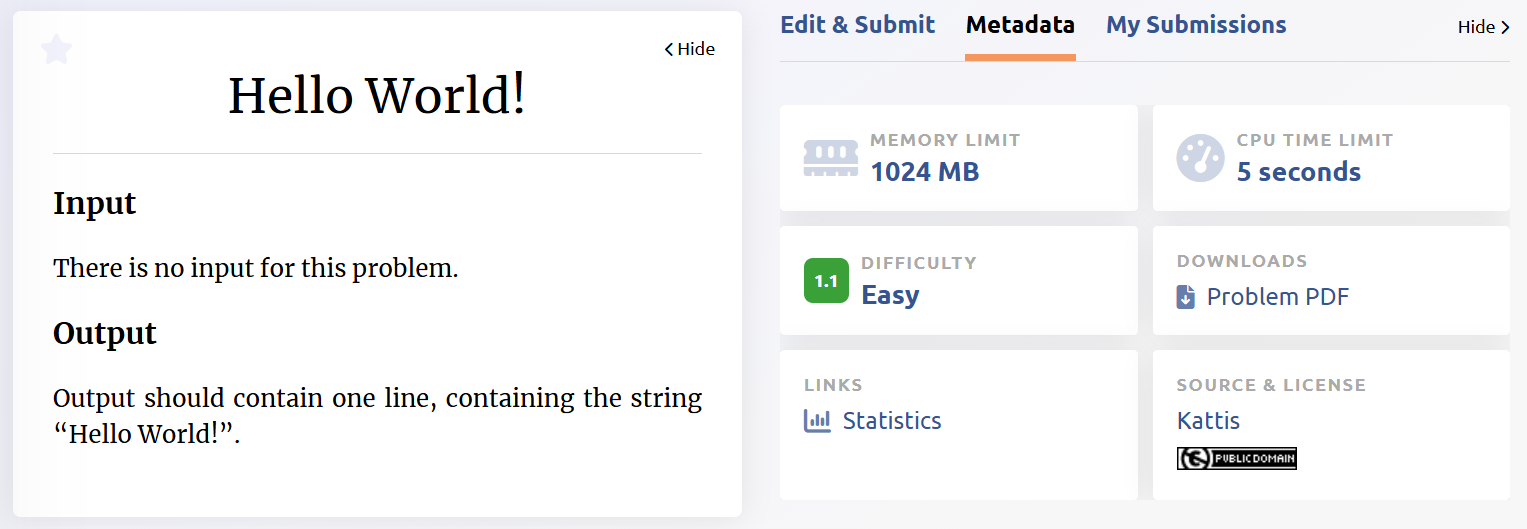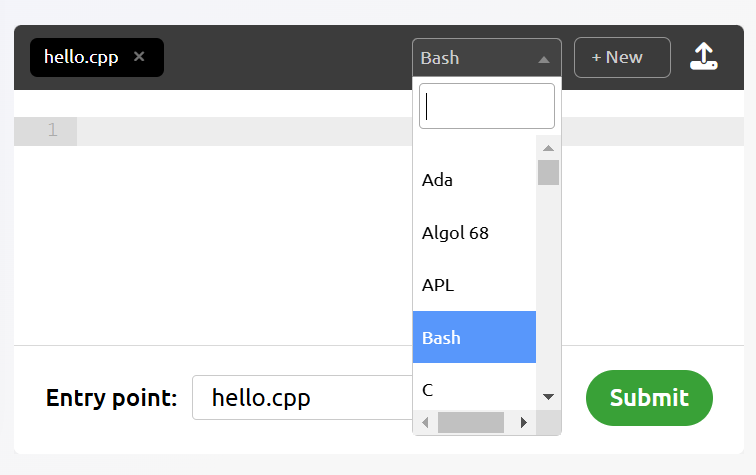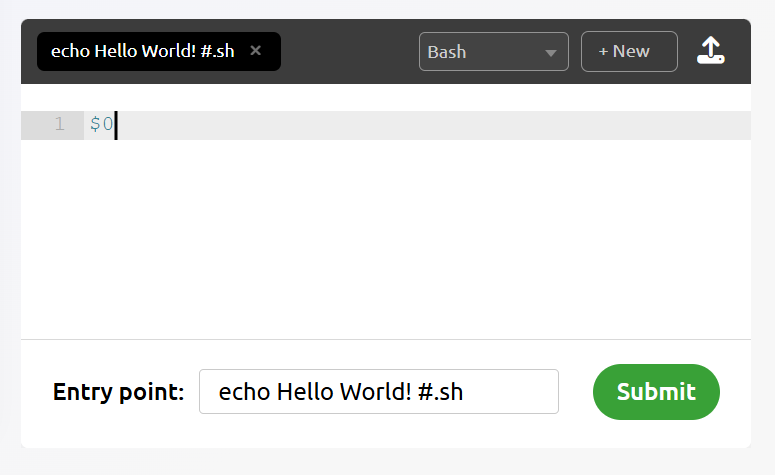How to cheat on Kattis (code golf edition)
Kattis is one of those popular competitive programming
sites, where people go to practice ICPC-style coding problems. I don’t use it
personally, but a while ago I found out they have a shortest code leaderboard.
The easiest problem on the site is called Hello World!,
where the task is simply to print Hello World! to STDOUT.

It seems straightforward at first, but if you check the leaderboards, the shortest submission to the problem is an astonishing
5 characters long (in Bash)! Common sense tells us that
Hello World! costs 12 characters alone, so this score should not be possible
from an entropy perspective…
I did some digging myself, and after re-discovering the solution, it is both disappointing and awesome at the same time (but mostly awesome).
Exploring the submitter#
For the most part, Kattis’ submission system is similar to other online judges. There is a dropdown menu to choose the language of your choice, a built-in code editor, and a big green submit button:

What is not so standard among other judges is the editable Entry point field, which allows one to rename the file of the program being executed. The reason this exists is that we are actually allowed to submit multiple files through the +New button in the top right corner. This is probably to allow submissions to import other files. Usually CP’ers just code everything in one file anyway, but it’s a cool feature, I guess. ¯\_(ツ)_/¯
From testing, it appears that the score is then calculated as the total size of all submitted files – so we can’t cheat by just placing all the logic in a non-entrypoint file.
However, this entrypoint feature leads to an evil idea: what if we put our code as the filename, and execute the filename in the actual program?
Filename smuggling#
So here’s the setup. We set our entrypoint to echo Hello World! #.sh and our
code as $0, which expands to the filename and executes it. The judge requires
the filename to end in .sh for Bash, hence the awkward comment.

If this works, we would technically have a valid 2-byte Hello World! program. But if we try to submit it, Kattis complains:
Error: Filename containing non-valid characters. Filename must begin and end with alphanumeric characters and may only contain alphanumeric characters and the special characters (.), dash (-), and underscore (_)
Also, submitting a filename that is too large will result in another error that says the filename must be between 2-64 characters long. For the regex enthusiasts, the filename must match:
/^[a-zA-Z0-9](?:[a-zA-Z0-9_.-]{,59}[a-zA-Z0-9])?\.sh$/
The task now reduces to finding a restricted Bash/filename polyglot matching the
above regular expression. However, this proves problematic for Bash because the
filename will inevitably get parsed as a single command that ends in .sh.
Switching languages#
Well, let’s forget about Bash for now! This raises the question: what other language has the esoteric property of being expressible with very few symbolic characters?
Why Perl, of course! It is well known that nearly anything can be a Perl program, and this regex is no exception.
Would you believe this is a valid Perl program that prints Hello World!:
eval-prin.t.v34.Hello.v32.World.v33.34.v59.pl
It is mostly abusing Perl’s “v-strings”, which converts ASCII characters to
characters (even though its intended usage is specifying version numbers). So
v33 by itself produces ASCII 33 (a.k.a. !) and the whole thing evals
a large concatenated string (since . is Perl’s concatenation operator) that
equals
-print"Hello World!";pl
The - sign is just to avoid a space after the eval, but does nothing
because Perl is chill like that.
Using this program as the entrypoint leads to a 6-byte solution in Perl with
eval$0, very similar to the invalid Bash solution we saw earlier.
To understand the timeline, I submitted this Perl solution to Kattis on
01/30/2024, and snatched the top score (before the Bash solutions existed).
Just one day later, “Chenzhang Hu” stole the top spot with a 5-byte solution in Bash. My score only lasted one day, how sad!
Reaching 5 bytes#
Fast forward one year later, I finally decided to have a crack at the Bash solution. It turns out there is one major trick in Bash that immediately widens the playing field – globbing.
In the context of a filesystem, globbing is used to obtain a list of files
that match a particular pattern, e.g. *.txt to get all files ending in .txt.
Recall that the Kattis submitter allows us to submit any number of files to the judge, whether we use them or not. These files are all placed in the same directory as the entrypoint file.
This prompts the following idea: say we wish to execute a command like cowsay.
Instead of using up all 6 characters, we can:
- Submit an empty file called
cowsayalong with the entrypoint. - In the code, replace
cowsaywithc*, which expands tocowsaysince that is likely the only file that begins withcin the working directory.
This type of glob injection lets us write virtually any command in just 2 characters!
In addition, if we supply multiple files that begin with the same letter, let’s
say echo and eggsandham, then executing e* in the entrypoint should
expand to echo eggsandham, which prints eggsandham.
Putting this into practice, we can outsource to Perl and copy over our previous
solution to get this 7-byte solution: p* -e$0.
But we can do better! Instead of using the -e flag to specify a program
string, we can pipe the input of our program into perl. This may not
seem intuitively shorter, but it can actually be done in 5 bytes:
e*|p*
To force the correct glob expansion, we create the following empty files:
echo
eval-prin.t.v34.Hello.v32.World.v33.34.v59.pl
perl
With this configuration, it becomes clear that e*|p* should expand to
echo eval-prin.t.v34.Hello.v32.World.v33.34.v59.pl|perl
And voilà! Submitting those three dummy files and an entrypoint file containing
just e*|p* lets us reach the final score of 5 characters.
Can we do better?#
That is a natural question. I spent about half a day trying to shorten it, but
could not manage it. Despite this, I would not be surprised if it were possible.
There are plenty of binaries in /usr/bin which could be useful targets, and
a sufficiently fancy mix of globs and Bash trickery might break past the 5-byte
barrier.
I am also not sure if the other two top solutions use the same method. It is possible that they are different, in which case it may be possible to combine them.
If you are reading this and are looking for a challenge, I encourage you to try to find a shorter solution, maybe even in some other language!
Other competitive programming sites#
Besides Kattis, there are some other CP sites with a shortest code leaderboard. What I’ve noticed from most of them, however, is that they usually have some flaw.
For example, another popular one called CSES allows any problem to be solved in 16 bytes in Ruby, because whitespace isn’t counted. I won’t spoil the solution here, but it is also a fun exercise and uses some pretty cursed Ruby techniques.
There is also CodinGame which has a dedicated Code Golf section, but I find that half of the challenges have weak test cases, or the optimal solution involves outsourcing to Bash.
On the topic of code golf, I recommend checking out code.golf. It has a great competitive atmosphere for getting serious about golfing.